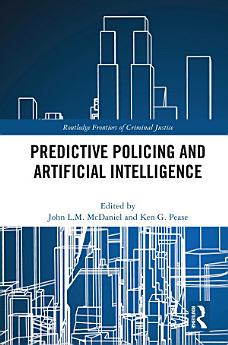Predictive Policing and Artificial Intelligence
John McDaniel · Ken Pease
Feb 2021 · Routledge
E-Book
330
Seiten
family_home
Zulässig
info
reportBewertungen und Rezensionen werden nicht geprüft Weitere Informationen
Über dieses E-Book
This edited text draws together the insights of numerous worldwide eminent academics to evaluate the condition of predictive policing and artificial intelligence (AI) as interlocked policy areas. Predictive and AI technologies are growing in prominence and at an unprecedented rate. Powerful digital crime mapping tools are being used to identify crime hotspots in real-time, as pattern-matching and search algorithms are sorting through huge police databases populated by growing volumes of data in an eff ort to identify people liable to experience (or commit) crime, places likely to host it, and variables associated with its solvability. Facial and vehicle recognition cameras are locating criminals as they move, while police services develop strategies informed by machine learning and other kinds of predictive analytics. Many of these innovations are features of modern policing in the UK, the US and Australia, among other jurisdictions.
AI promises to reduce unnecessary labour, speed up various forms of police work, encourage police forces to more efficiently apportion their resources, and enable police officers to prevent crime and protect people from a variety of future harms. However, the promises of predictive and AI technologies and innovations do not always match reality. They often have significant weaknesses, come at a considerable cost and require challenging trade- off s to be made. Focusing on the UK, the US and Australia, this book explores themes of choice architecture, decision- making, human rights, accountability and the rule of law, as well as future uses of AI and predictive technologies in various policing contexts. The text contributes to ongoing debates on the benefits and biases of predictive algorithms, big data sets, machine learning systems, and broader policing strategies and challenges.
Written in a clear and direct style, this book will appeal to students and scholars of policing, criminology, crime science, sociology, computer science, cognitive psychology and all those interested in the emergence of AI as a feature of contemporary policing.
AI promises to reduce unnecessary labour, speed up various forms of police work, encourage police forces to more efficiently apportion their resources, and enable police officers to prevent crime and protect people from a variety of future harms. However, the promises of predictive and AI technologies and innovations do not always match reality. They often have significant weaknesses, come at a considerable cost and require challenging trade- off s to be made. Focusing on the UK, the US and Australia, this book explores themes of choice architecture, decision- making, human rights, accountability and the rule of law, as well as future uses of AI and predictive technologies in various policing contexts. The text contributes to ongoing debates on the benefits and biases of predictive algorithms, big data sets, machine learning systems, and broader policing strategies and challenges.
Written in a clear and direct style, this book will appeal to students and scholars of policing, criminology, crime science, sociology, computer science, cognitive psychology and all those interested in the emergence of AI as a feature of contemporary policing.
Autoren-Profil
John L.M. McDaniel teaches and researches within the University of Wolverhampton Department of Social Science, Inclusion and Public Protection and is an active member of the University’s Law Research Centre. He focuses on issues of police accountability, corruption, human rights, and international cooperation and security.
Ken G. Pease is a Professor in Policing at the University of Derby. He has written numerous books on policing, psychology and crime science.
Dieses E-Book bewerten
Deine Meinung ist gefragt!
Informationen zum Lesen
Smartphones und Tablets
Nachdem du die Google Play Bücher App für Android und iPad/iPhone installiert hast, wird diese automatisch mit deinem Konto synchronisiert, sodass du auch unterwegs online und offline lesen kannst.
Laptops und Computer
Im Webbrowser auf deinem Computer kannst du dir Hörbucher anhören, die du bei Google Play gekauft hast.
E-Reader und andere Geräte
Wenn du Bücher auf E-Ink-Geräten lesen möchtest, beispielsweise auf einem Kobo eReader, lade eine Datei herunter und übertrage sie auf dein Gerät. Eine ausführliche Anleitung zum Übertragen der Dateien auf unterstützte E-Reader findest du in der Hilfe.





